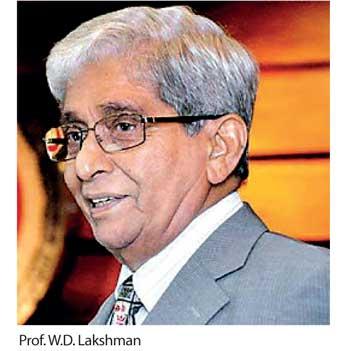Reply To:
Name - Reply Comment
Central Bank Governor Prof. W.D. Lakshman issuing a special statement yesterday assured the resilience of Sri Lanka’s financial system and all possible measures taken by the Central Bank to ensure the safety of the deposits of the general public.
“There has been speculation by various groups and individuals that Sri Lanka’s financial system and financial institutions are in a weak position and that the general public is at risk of losing their deposits made at those institutions.

As the regulator of both banking and non-bank financial institutions that accept public deposits in the country, the Central Bank of Sri Lanka wishes to assure the general public that it will continue to take all possible measures to ensure the safety of public deposits,” Governor Lakshman said.
He said even before the COVID-19 pandemic there was a rise in non-performing loans in both banks and non-bank financial institutions, particularly due to sluggish growth in private sector credit and overall economic activity.
“The banking sector remains strong with total capital adequacy ratio above 16 percent, net stable funding ratio above 130 percent, liquidity coverage ratio above 175 percent and statutory liquid asset ratio above 32 percent. The nonperforming loans ratio has shown some decline while the provision coverage ratio also picked up during the first quarter of 2020.
Benefitting from the new tax regime, profits after tax of the banking sector for the first quarter of 2020 were considerably higher than in the same quarter last year. With these performance indicators, I do not think anyone needs an additional assurance on the current strength of the banking system, which accounts for 62 percent of Sri Lanka’s financial sector,” Governor Lakshman said.
Meanwhile, commenting on the non-bank sector, he said speculation gathered on the stability of the sector with the cancellation of the licence of the Finance Company PLC.
“…I must emphasise that the cancellation of the licence of The Finance Company PLC and regulatory action against a few other finance companies in the recent past were done to protect the depositors and to ensure financial system stability.
The cancellation of the licence has enabled us to provide full compensation through the Sri Lanka Deposit Insurance and Liquidity Support Scheme for 93 percent of depositors of The Finance Company PLC numbering 135,100. The remaining 10,072 depositors of the company will also get compensation up to Rs 600,000 per deposit holder at the outset.,” he noted.
“In similar previous cancellations of licences of Central Investments and Finance PLC and The Standard Credit Finance Ltd, 95 percent of depositors in each of these companies have been fully compensated by now.
Compensation payments to depositors of TKS Finance Ltd have been delayed and limited to 26 percent, due to judicial proceedings, but the Central Bank has recommenced the process of compensation and expects to cover almost all depositors of this company,” he added.
Governor Lakshman stressed that corrective regulatory action taken in respect of a few institutions does not mean that the entire non-bank financial institutions sector is in trouble.
“Therefore, I would like to urge the general public not to be distracted or misled by baseless comments and malicious speculations expressing doubt about the health of our non-bank financial institutions sector as a whole,” he said.
Governor Lakshman also empahsised that although various financial institutions are licensed, regulated and supervised by the Central Bank, it did not mean that all their operations are managed by the Central Bank on a day-to-day basis.
“Business models of these institutions are different from one another, enabling them to offer different levels of interest compensation for depositors benefitting from their investments in businesses generating higher returns.
The general public must therefore take note of the fact that higher interest rates offered on deposits generally mean that the relevant institutions are engaged in more risky ventures,” he said.
Meanwhile, Governor Lakshman said Central Bank’s stance of the non-bank financial sector is that it needs consolidation.
“We have highlighted, time and again, that Sri Lanka has too many financial institutions given the size of its economy. At the same time, we urge financial institutions to diversify their business models, particularly to support domestic production activity, rather than being driven purely by short term gains through financing imports and other business activities familiar to them.
The Central Bank will use its authority and powers in the future to get the non-bank financial institutions as well as banking institutions behave as suggested above,” he said.
Governor Lakshman reiterated that the Central Bank would use all available tools at its disposal to maintain financial system stability.
“It also must be noted that the Central Bank will not hesitate to take legal action against individuals and groups spreading false or misleading information with intentions of creating unjustified disruptions in the bank and non-bank financial sectors,” he concluded.